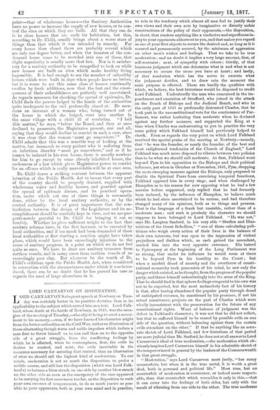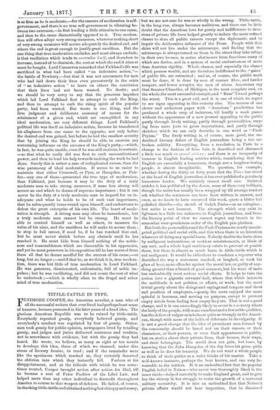LORD CARNARVON ON MODERATION.
LORD CARNARVON'S eloquent speech at Newbury on Tues- day was certainly better in its positive doctrine than in its applicability to the subject which served him as a text. Lord Falk- land, whose death at the battle of Newbury, in 1643, was the occa- sion of the meeting of Tuesday,—•the object being to erect a monu- ment to his memory,—was, if we have learned his character aright from the better authorities on the Civil War, rather an illustration of those alternating though warm and noble impulses which induce a man first to throw himself on to one and then on to the opposite side of a great struggle, from the conflicting feelings by which he is affected, when he contemplates, first, the evils he desires to control, and next, the evils inevitable in the measures necessary for securing that control, than an illustration of what we should call the highest kind of moderation. To our minds, moderation is not so much the disposition to prefer a middle course, and still less the disposition (which was Lord Falk- land's) to balance a blow struck on one side by another blow struck on the other side so soon as the emergency of the case appeared to be carrying the first movement too far, as the disposition to curb your own excesses of temperament, to do as much justice as pos- sible to your opponents, both in your own mind and in practice, to rein in the tendency which almost all men feel to justify their own views and their own acts by imaginative or directly unfair constructions of the policy of their opponents,—the disposition, in short, that renders anything like a vindictive and superfluous in- jury to your opponents abhorrent to you, and that makes you regard as one of your first objects to secure the desired end, so long as it is secured and permanently secured, by the minimum of aggression on other men's wishes and feelings. That we take to be true moderation ; and no doubt it implies a very large amount, first, of self-restraint ; next, of sympathy with others ; thirdly, of that luminous judgment which can determine what is and what is not necessary to secure the cause you have at heart ; and lastly, of that resolution which has the nerve to execute what the judgment decides, and to draw rein the moment the main purpose is effected. These are hardly the qualities with which, we believe, the best historians would be disposed to credit Lord Falkland. Undoubtedly the man who concurred in the im- peachment and execution of Strafford, who joined in the attack on the Bench of Bishops and the Judicial Bench, and who in the early part of 1641 so profoundly distrusted Charles, that he took part in the unconstitutional vote for the continuance of Par- liament, was rather hesitating than moderate when he declared against any further measure, and supported the King at a time when Charles was endeavouring to put in practice the very same policy which Falkland himself had previously helped to check. Even as regards the very point on which Lord Falkland received the special praise of the meeting at Newbury—namely, that " he was the founder, or nearly the founder, of the best and most enlightened tendencies of the Church of England," Lord Falkland was much more disposed to vibrate between two policies than to be what we should call moderate. At first, Falkland went beyond Pym in his opposition to the Bishops and their political influence, yet when in October or November, 1641, Pym, dropping the more sweeping measure against the Bishops, only proposed to disable the Spiritual Peers from exercising temporal functions, Falkland opposed him in every stage, and when challenged by Hampden as to his reason for now opposing what he had a few months before supported, only replied that he had formerly been induced, by the influence of Hampden, to believe much which he had since ascertained to be untrue, and had therefore changed many of his opinions, both as to things and persons. That is the language of a frank but unstable, rather than of a • moderate man ; and such is precisely the character we should suppose to have belonged to Lord Falkland. " He was not," says Mr. Langton Sanford, in his very able " Studies and Illus- trations of the Great Rebellion," " one of those calculating poli- ticians who weigh every action of their lives in the balance of their own interests, but was open to the impression of violent prejudices and dislikes which, as each gained the ascendant, carried him into the very opposite extremes. His hatred to Episcopacy at the beginning of the Long Parliament was so strong, that under its influence he would seem at times to be beyond Pym in his hostility to the Court ; but when a morbid dread of anarchy and the overthrow of consti- tutional monarchy took possession of his mind, he saw only the danger which existed, as he thought, from the progress of th e popular party, and threw himself unhesitatingly into the arms of the King. That he should find in that sphere feelings congenial to his own was not to be expected, but the most melancholy fact of his history is that, after having abandoned the popular party through dread of anticipated excesses, he sanctioned by his presence, if not his actual connivance; projects on the part of Charles which were wholly inconsistent with the preservation for the future of any constitutional rights. Want of balance of judgment was the defect in Falkland's character; it was not that he did not reflect, but that he suffered himself to be scared by possible evils on one side of the question, without balancing against them the certain evils attendant on the other." If that be anything like an accu- rate sketch of Lord Falkland, and few historians of that period are more judicial than Mr. Sanford, he does not stall answer to Lord Carnarvon's ideal of true moderation,—the moderation which ob- viously inspires Lord Carnarvon himself in his admirable sketch of the temper evinced in general by the leaders of the Commonwealth in that great struggle.
"Moderation," says Lord Carnarvon most justly, "has many counterfeits, but when it is the true metal, it is worth a great deal, both in personal and political life." Most true, but no counterfeit of moderation is commoner, or indeed more respect- able, than that counterfeit which resembles it only in this,—that it can enter into the feelings of both sides, but only with the result of vibrating from one side to the other. The true moderate is as Arm as he is moderate,—for the essence of moderation is self- government, and there is no true self-government in vibrating be- tween two extremes,—in first lending a little stimulus to one cause, and then to the cause diametrically opposed to it. True modera- tion will often adopt very strong measures, wherever nothing short of very strong measures will secure adequately the desired end, and where the end is great enough to justify great sacrifices. But the one thing that true moderation excludes, and must always exclude, is that vacillation which tends to neutralise itself, and therefore to increase, instead of to diminish, the cost at which the end it aims at must be bought. Lord Carnarvon remarked that Falkland's life was sacrificed in what had been called " an indecisive action,"— the battle of Newbury,—but that it was not uncommon for men who had laid down their lives even prematurely in the crisis of " an indecisive action " to leave on others the conviction that their lives had not been wasted. No doubt ; and we should be very sorry to say that the generous impulses which led Lord Falkland first to attempt to curb the King, and then to attempt to curb the rising spirit of the popular party, bad been wasted. But waste is one thing, and the firm judgment and deliberate economy of means for the attainment of a given end, which are exemplified in any ideal moderation, are very different things. Lord Falkland's political life was itself an indecisive action, because he transferred his allegiance from one cause to the opposite, not only before the desired end was gained, but before he had the smallest security that by joining the King he should be able to exercise any restraining influence on the excesses of the King's party,—which, in fact, he was quite unable, even if he was still anxious, to restrain, —so that what he really did was first to curb unconstitutional power, and then to lend his help towards undoing the work he had done. Surely this is rather a case of reduplicated excess, than the wise parsimony of ideal moderation. It seems to us easier to maintain that either Cromwell, or Pym, or Hampden, or Fair- fax—any one of them—presented the true type of moderation, than Falkland, just because it may be the duty of a truly moderate man to take strong measures, if none less strong will secure an end which he deems of supreme importance ; but it can never be the duty of a truly moderate man to imperil for an in- adequate end what he holds to be of such vast importance, that he subsequently turns round upon himself, and endeavours to defeat the great enterprise of his own life. The heart of mode- ration is strength. A strong man may often be immoderate, but a truly moderate man cannot but be strong. He must be able to control himself as well as others, to measure the value of his aims, and the sacrifices he will make to secure them ; to stop in full career, if need be, if he has reached that end, but he must never shrink before any obstacle until he has reached it. He must hide from himself nothing of the noble- ness and reasonableness which are discernible in his opponents, and yet he must persevere in his opposition till he has wrested from them all that he deems needful for the success of his cause,—so long, but no longer ;—and if that be, as we think it is, true modera- tion, there was but little of true moderation in Lord Falkland. He was generous, disinterested, enthusiastic, full of noble im- pulses ; but he was vacillating, and did not count the cost of what he undertook ;—which is wholly alien to the frugal and sober mind of true moderation.







































 Previous page
Previous page